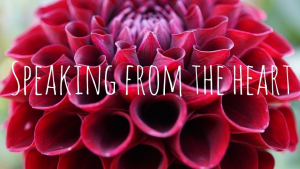Supporting and contributing to others well-being is a very strong universal human need. We all want to be of service, have a positive effect in our loved ones life and offer the best support we possible can. The trap that most of all fall into when our closest ones are sharing something challenging is that we want to fix it. It most often is because we have a hard time being with OUR OWN emotions, that are triggered when seeing our friend in pain. So what we really want is for our friend to be well again so that WE can feel relaxed. This does not work as a support. Neither does:
Giving advice ”I think that you should try to act like you don’t ́t care and don’t answer any of his calls.”
Telling stories/referring to ourselves or our own experience ”The same thing happened to me and it was terrible. I ended up looking for a job for months after that until I finally realized that I wanted to change my career and go back to school…”
Comforting ”I can’t believe he said that, you are worth so much more. I am sure he will realize it and come back to you. And if not, you will find someone else.”
Diminishing the situation ”Never mind, it is not like she was a good girlfriend. You always fought anyway.”
Cheering up ”Don ́t worry, a drink out on the town will make you feel better!!”
Analyzing ”I guess he is feeling insecure and that’s why he is being so rude to you.”
So how can we support in a different way?
THE DEEP HUMAN NEED TO BE HEARD AND RECEIVED
All of these strategies to support are not offering the other the possibility to simply be with their feelings, with the support of someone else’s presence. It is not dangerous to be sad or feel pain. It is natural and the healing is when we take the space to feel it. This can be challenging and that is why we try to escape it. True support is to encourage to stay with oneself and feel our pain and not run away. Because we know that it is the most loving thing to do.
The other aspect is the enormous healing of being heard and received as we are – which most of us were lacking during our childhood. That someone simply stays with us, allowing us to be where we are and welcoming us. This is a very different experience from someone trying to fix us – which is basically saying that something is wrong with where I am at the moment. It would be better if I was in a different state. When we think about our own pain in this way, like something that shouldn’t be there, we also relate to others pain in the same way.
EMPATHY – OFFERING YOUR PRESENCE AS SUPPORT
I my experience, one of the best support we can offer is Empathy. The presence and attention, to really try to see the world from our partners perspective without going into sympathy (taking over the feelings in our system). Being there without any judgements – to be present with the spirit of allowance, that whatever the other is experiencing is welcomed, nothing is wrong or bad. Instead of offering any advice, try to comfort, fix or cheer up we offer our loving presence, listening from the fullness of our hearts.
HOW CAN WE ACTIVELY “OFFER EMPATHY”?
One way to offer empathy to someone is to simply be there in silence and listen. If we want to be more active we need to make sure that our focus is still kept on our friend and that we are holding our intention close – to be with our friend in this moment and welcome her/him exactly as he/she is, no fixing needed, nothing is wrong – remember that the healing thing is to feel it.
OFFER EMPATHY TROUGH MIRRORING
Another way of offering Empathy is in form of mirroring – reflecting back with the same words or your own what you heard your friend says. Keep the focus on her/his feelings and needs. The most important thing is to come from the place and understanding that – I do not know best, my partner knows best about what she/he is feeling and needing – and to let go of any fixing!
OFFER EMPATHY THROUGH QUESTIONS
The third thing we can offer is questions. The same thing here – keep your focus on your friends’ feelings and needs and let go of any goal – let your curiosity guide you! The intention is both for us to understand better and also to offer our friend a deepening in her/his own self connection. We are offering support by moving the Inquiry forward. To know more about Inquiry, read y post: “Inquiry – the joureny is the purpose”
IF YOU DON´T KNOW – ASK
If you feel insecure about what would support your friend – ASK! It is a very empowering and simple way to find out. If she/he does not know, you might be able to together figure it out.
The most important is that you are holding the intention and awareness that your presence is your biggest gift. Fixing, giving advice, comforting, cheering up, referring to ourselves or analyzing the situation is NOT empathy and all most never leave us feeling heard and received.
FEEDBACK – DID I CONTRIBUTE?
When we genuinely want to contribute to someone we also want to know that it did have an actually positive effect. So any form of feedback, the classic one would be “thank you”, which I personally don’t enjoy equally as much as understanding what worked and how it worked for my friend. “Thank you” does not say much and especially not because most of us were taught as children to say “thank you” and are still often (unconsciously) doing it out of habit or ideas that we should.
I suggest instead that we ask for feedback, when the time is right. What worked? What did not work? How was it for our friend? Did she/he feel seen, heard, received?
INVITATIONS FOR SELF INQUIRY PRACTICES TO SUPPORT YOUR EMPATHIC CONNECTION:
- I invite you to listen in silence to someone for a few minutes and practice to see the world from their point of view. Keep your focus on the feelings and needs expressed behind the words and then inquiry into (explore) how this experience was for you as a listener. Was it easy and relaxing or challenging and tense? What ideas came up for you? (Exemple that you should be saying something smart or doing something to fix the situation). If it works, you can also ask the person who was sharing how it was for her/him to be heard in this way.
- You can also set this practice up in an agreement with someone where you sit down together and speak each for 5 minutes (with the support of an alarm) with the other one listening in silence and then you change. And finishing with sharing how it was to listen and be heard in this way.
- Another suggestion is to explore with paper and pen what ideas you have about support and vulnerable, painful feelings.
- Awareness practice: look into your own patterns of offering support to your friends. Do you have a tendency to give advice, comfort, analyze or cheering up. Ask yourself what the beautiful need you are trying to meet by doing so?
If you want to read more about the power of empathy and how to deepen your listening, read my post on ”The art of listening – relax and enjoy”.
Marshall Rosenberg`s book “Nonviolent Communication – A language of life” is a great place to start to understand the power of empathy and human needs. It is very clear and easy to grasp and I highly recommended to everybody, Find it here!



